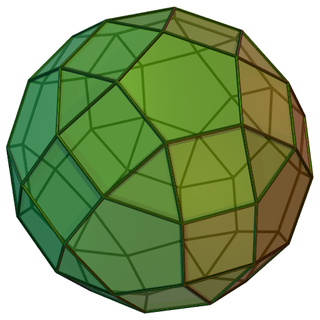Top Qs
Timeline
Chat
Perspective
Metabigyrate rhombicosidodecahedron
74th Johnson solid (62 faces) From Wikipedia, the free encyclopedia
Remove ads
In geometry, the metabigyrate rhombicosidodecahedron is one of the Johnson solids (J74). It can be constructed as a rhombicosidodecahedron with two non-opposing pentagonal cupolae rotated through 36 degrees. It is also a canonical polyhedron.
A Johnson solid is one of 92 strictly convex polyhedra that is composed of regular polygon faces but are not uniform polyhedra (that is, they are not Platonic solids, Archimedean solids, prisms, or antiprisms). They were named by Norman Johnson, who first listed these polyhedra in 1966.[1]
Alternative Johnson solids, constructed by rotating different cupolae of a rhombicosidodecahedron, are:
- The gyrate rhombicosidodecahedron (J72) where only one cupola is rotated;
- The parabigyrate rhombicosidodecahedron (J73) where two opposing cupolae are rotated;
- And the trigyrate rhombicosidodecahedron (J75) where three cupolae are rotated.
Remove ads
External links
Wikiwand - on
Seamless Wikipedia browsing. On steroids.
Remove ads


